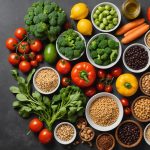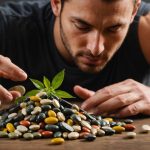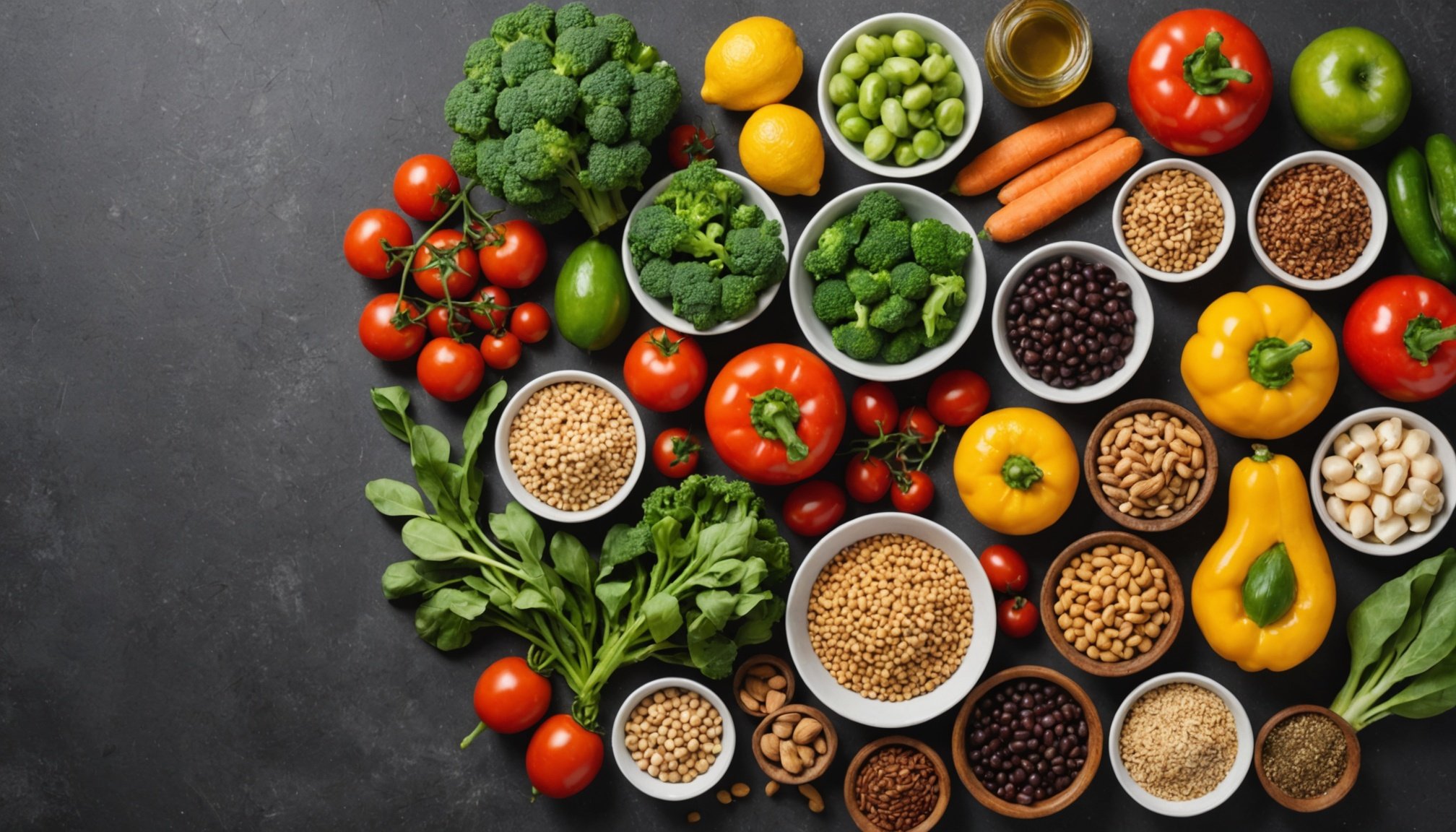Essential Nutrients Every Vegan Should Track to Prevent Deficiencies: A Comprehensive Guide
Adopting a vegan diet can be a highly rewarding choice for both your health and the environment, but it requires careful attention to ensure you are getting all the necessary nutrients. Here’s a detailed guide to help you navigate the key nutrients that vegans need to track to prevent deficiencies.
Understanding the Vegan Diet
Before diving into the specifics, it’s important to understand what a vegan diet entails. A vegan diet is a variant of the vegetarian diet where only plant-based foods are consumed, and all animal products, including eggs, dairy, and even honey, are excluded.
Topic to read : Top Strategies for Effectively Tracking Blood Sugar Levels in Children Living with Diabetes
Protein: The Building Block of Health
One of the most common questions vegans face is, “Where do you get your protein?” The good news is that protein is abundant in plant foods.
High-Protein Plant Foods
- Legumes: Beans, lentils, and chickpeas are excellent sources of protein.
- Nuts and Seeds: Almonds, chia seeds, and hemp seeds are all high in protein.
- Tofu and Tempeh: These soy products are versatile and rich in protein.
- Meat Substitutes: Soya burgers, soya sausages, and seitan can be high-quality protein sources, but use them in moderation due to their potential high salt and fat content.
Here’s a quick look at the protein content in some common plant-based foods:
Additional reading : Unveiling the Best Natural Supplements to Boost Your Libido Effectively
| Food Item | Protein Content (per serving) |
|---|---|
| Lentils (1 cup) | 18 grams |
| Chickpeas (1 cup) | 15 grams |
| Tofu (1/2 cup) | 10-15 grams |
| Tempeh (1/2 cup) | 15 grams |
| Soymilk (1 cup) | 7 grams |
| Seitan (3 oz) | 21 grams |
Practical Tips
- Include a variety of high-protein foods in your meals to ensure you meet your daily protein needs.
- For strength athletes or those who require higher protein intake, consider consulting a nutritionist to tailor your diet accordingly.
Vitamin B12: The Crucial Vitamin
Vitamin B12 is perhaps the most critical nutrient for vegans to monitor, as it is not available from plant sources.
Why Vitamin B12 is Important
- Vitamin B12 is essential for the formation of red blood cells, nerve function, and DNA synthesis. A deficiency can lead to fatigue, anemia, and nerve damage.
Sources for Vegans
- Fortified Foods: Some breakfast cereals, yeast extracts, soya yoghurts, and plant-based dairy alternatives are fortified with vitamin B12. Always check the labels.
- Supplements: The Vegan Society recommends taking a supplement of at least 10mcg daily or at least 2000mcg weekly to ensure adequate intake.
Here’s what the Vegan Society suggests for vitamin B12 intake:
- Eat fortified foods at least twice a day, aiming for 3mcg of vitamin B12 per day.
- Take a supplement of at least 10mcg daily or at least 2000mcg weekly.
Iron: The Mineral for Healthy Blood
Iron is vital for health, and its deficiency can cause anemia.
Plant Sources of Iron
- Legumes: Beans, lentils, and peas.
- Whole Grains: Oats, barley, and quinoa.
- Nuts and Seeds: Pumpkin seeds, sesame seeds, and sunflower seeds.
- Dried Fruits: Dates, apricots, and prunes.
- Green Leafy Vegetables: Spinach, kale, and collard greens.
Enhancing Iron Absorption
- Vitamin C: Eating foods rich in vitamin C (like citrus fruits, strawberries, and bell peppers) along with iron-rich foods can significantly increase iron absorption.
Vitamin D: The Sunshine Vitamin
Vitamin D is crucial for bone health and immune function.
Sources for Vegans
- Sun Exposure: While sun exposure can generate vitamin D, it is not always reliable, especially during winter months or for those with darker skin.
- Supplements: Recommended by dermatologists to avoid skin cancer risks.
- Fortified Foods: Some plant-based milk and cereals are fortified with vitamin D.
Here’s a quick guide to vitamin D intake:
| Age Group | Recommended Daily Intake (IU) |
|---|---|
| Infants | 400 IU |
| Children | 600 IU |
| Adults | 600 IU |
| Seniors | 800 IU |
Practical Tips
- Consult with a healthcare provider to determine the best source of vitamin D for your specific needs.
- Ensure regular sun exposure, but safely, to avoid skin cancer risks.
Calcium: The Bone Builder
Calcium is essential for maintaining strong bones and teeth.
Plant-Based Sources of Calcium
- Fortified Plant-Based Milk: Soya milk, almond milk, and oat milk.
- Dark Leafy Greens: Kale, broccoli, and spinach.
- Tofu and Edamame: These soy products are rich in calcium.
- Nuts and Seeds: Almonds, sesame seeds, and chia seeds.
Practical Tips
- Include a variety of calcium-rich foods in your diet.
- Consider fortified foods to ensure adequate calcium intake.
Iodine: The Thyroid Guardian
Iodine is crucial for thyroid function and hormone production.
Sources for Vegans
- Iodized Salt: A common source, but use in moderation due to high sodium content.
- Seaweed: Some types of seaweed are naturally rich in iodine, but be cautious of excessive intake.
- Fortified Foods: Some plant-based milk and cereals may be fortified with iodine.
- Supplements: Often necessary to ensure adequate intake.
Here’s what studies have reported about iodine intake in vegans:
- Iodine Deficiency: Common in vegans due to the lack of animal products, which are natural sources of iodine.
- Supplementation: Recommended to avoid thyroid problems such as hypothyroidism.
Zinc: The Immune Booster
Zinc is important for immune function and growth.
Plant-Based Sources of Zinc
- Legumes: Beans, lentils, and peas.
- Nuts and Seeds: Pumpkin seeds, sunflower seeds, and chia seeds.
- Whole Grains: Quinoa, brown rice, and whole wheat.
- Fortified Cereals: Some breakfast cereals are fortified with zinc.
Enhancing Zinc Absorption
- Fermented Foods: Tempeh and miso can increase zinc absorption.
- Soaking and Rinsing: Soaking dried beans and then rinsing them before cooking can help.
Omega-3 Fatty Acids: The Heart Health Guardians
Omega-3 fatty acids, particularly EPA and DHA, are crucial for heart health and brain function.
Plant-Based Sources
- Alpha-Linolenic Acid (ALA): Found in flaxseeds, chia seeds, and walnuts.
- Algal Oil Supplements: A direct source of EPA and DHA for vegans.
Here’s a comparison of omega-3 sources:
| Source | Omega-3 Content |
|---|---|
| Flaxseeds | ALA |
| Chia Seeds | ALA |
| Walnuts | ALA |
| Algal Oil | EPA and DHA |
Practical Tips
- Include ALA-rich foods in your diet.
- Consider algal oil supplements for direct EPA and DHA intake.
Monitoring Your Nutrient Levels
Regular health checks are crucial to ensure you are not deficient in any key nutrients.
Blood Tests
- Complete Blood Count (CBC): To check for anemia, vitamin B12, and folate levels.
- Red Blood Cell Indices: To monitor MCV (mean corpuscular volume) and RDW (red blood cell distribution width) for signs of anemia.
Here’s what Dr. Kyle Riding, a medical laboratory scientist, advises:
- “If you’re living and enjoying a vegan lifestyle, it’s very important that you always speak to one of your healthcare professionals… to guide you on that journey to assure that you’re getting the right supplements that you need to really take full advantage of that dietary lifestyle that you’re choosing and that you should value for yourself.”
Top Tips for a Balanced Vegan Diet
Here are some key tips to ensure your vegan diet is well-balanced and nutritious:
- Eat a Variety of Plant Foods: Include a wide range of fruits, vegetables, whole grains, nuts, and seeds.
- Choose Fortified Foods: Opt for fortified plant-based milk, cereals, and other products to ensure adequate intake of vitamins and minerals.
- Consult a Nutritionist: Seek advice from a qualified nutritionist to tailor your diet to your specific needs.
- Regular Health Checks: Ensure regular medical check-ups to monitor your nutrient levels and adjust your diet or supplements as needed.
Adopting a vegan diet can be a rewarding and healthy choice, but it requires careful planning to ensure you are getting all the necessary nutrients. By understanding the key nutrients to track and how to obtain them, you can maintain optimal health and enjoy the benefits of a well-planned vegan diet.
Remember, a balanced vegan diet is not just about avoiding animal products; it’s about embracing a wide variety of plant-based foods and supplements to support your overall health and well-being. With the right knowledge and planning, you can thrive on a vegan diet and enjoy all its benefits.











